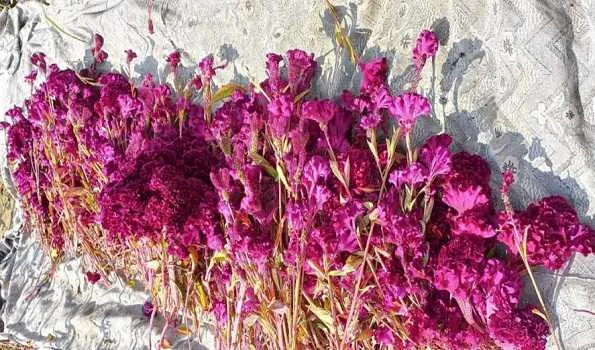Srinagar: Cockscomb, locally known as “Mawal,” is gaining renewed attention from farmers in Kashmir due to its potential to generate significant revenue.
This vibrant flower, also called the Amaranthus Velvet Flower, has long been a staple in Kashmiri cuisine, where it is used as a natural food colouring and flavoring agent.
The dried Mawal, traditionally featured in Kashmiri feasts, was recently exported in a 120 kg consignment to the USA in 2023, according to the records of the Agriculture Department of Kashmir.
One of the leading growers of this flower is Shabir Khanday from Utikoo Bangil in North Kashmir’s Baramulla district. Since 2019, Khanday has been cultivating cockscomb, and his efforts have paid off significantly.
The Agriculture Department declared Utikoo Bangil an “organic village” and selected around 100 farmers for various projects, providing them with cockscomb saplings to test in their fields.
“The Agriculture department provided me with the saplings of cockscomb. Initially I planted the saplings of cockscomb on a kanal of land with proper care and with the passage of time, the crop growled tremendously to the astonishment of everyone and fetched me a good revenue,” Khanday told UNI.
“Later I decided to expand it to three kanals of land with a thought that even if it does not fetch me handsomely, I will still promote it in local market for my own business,” he said and claimed “the harvesting of the crop that takes place in every September excited me as the Department of Agriculture purchase it on a handsome rates.”
The Agriculture Department’s efforts to connect local farmers like Khanday with international markets have paid off.
In 2021, during an exhibition in Srinagar, a buyer from Dubai purchased 50 kg of cockscomb at a premium price. Furthermore, the Agriculture Department has facilitated exports to countries such as the USA and Dubai, linking Kashmiri cockscomb with global markets.
Khanday’s success has inspired many neighboring farmers to take up the cultivation of cockscomb, seeing the potential for profitable returns with minimal labor investment.
He now provides saplings to local villagers, encouraging them to plant cockscomb on small plots of land for a steady income.
Khanday said this crop requires relatively little maintenance, and presents an ideal opportunity for farmers looking to diversify their agricultural portfolio and capitalize on the growing demand for unique, natural products in both local and international markets.
In addition to its culinary uses, cockscomb has medicinal properties. Its vibrant colour is often used to make herbal teas, which are known for their antioxidant content and health benefits. Moreover, the flower’s color remains intact for up to a year if properly preserved, making it a valuable commodity for export.
UNI

